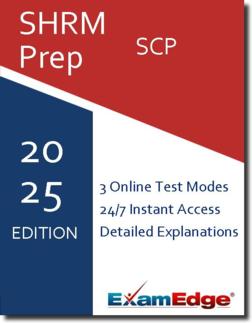SHRM Senior Practice Tests & Exam Prep Questions - Topics
Based on 17 Reviews
- Real Exam Simulation: Timed questions and matching content build comfort for your SHRM SCP test day.
- Instant, 24/7 Access: Web-based SHRM Senior Certified Professional practice exams with no software needed.
- Clear Explanations: Step-by-step answers and explanations for your SHRM exam to strengthen understanding.
- Boosted Confidence: Reduces anxiety and improves test-taking skills to ace your SHRM Senior Certified Professional (SHRM-SCP).

Understanding the exact breakdown of the SHRM Senior Certified Professional test will help you know what to expect and how to most effectively prepare. The SHRM Senior Certified Professional has 134 multiple-choice questions The exam will be broken down into the sections below:
| SHRM Senior Certified Professional Exam Blueprint | ||
|---|---|---|
| Domain Name | % | Number of Questions |
| Organization | 18% | 24 |
| People | 18% | 24 |
| Leadership | 17% | 23 |
| Business | 16.5% | 22 |
| Interpersonal | 16.5% | 22 |
| Workplace | 14% | 19 |


